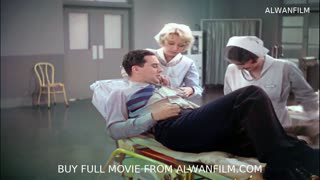Premium Only Content

Palmy Days Colorized
Palmy Days Colorized
Review: Palmy Days 1931 Colorized - A Journey into Early Cinema
Introduction
In the annals of cinematic history, "Palmy Days" (1931) stands out as a remarkable artifact from the early days of sound film. Directed by A. Edward Sutherland and starring Eddie Cantor, this pre-Code musical comedy offers a fascinating glimpse into the world of 1930s Hollywood. The film is a testament to the era's exuberance and creativity, with its comedic antics, musical numbers, and innovative use of sound and color. In this article, we will explore the significance of "Palmy Days," delve into its story and characters, and discuss the impact of its early colored version on the viewing experience.
Check The Full Colorized Movies List
Check Our YouTube Channel
Check Our Colorized Movies Trailer Channel
Understanding Palmy Days 1931 Colorized: Director, Cast, and Genre
"Palmy Days" was directed by A. Edward Sutherland, a filmmaker known for his work in the comedy genre during the early days of sound cinema. Sutherland's directorial vision brought a lively and dynamic energy to the film, which was enhanced by the performances of its stellar cast.
The film stars Eddie Cantor, a beloved comedian and entertainer of the era, who brings his signature style and charisma to the role of Eddie Simpson. The cast also includes Charlotte Greenwood as Miss Polly, George Raft in a supporting role, and Barbara Weeks as Helen Martin, adding depth and charm to the ensemble.
"Palmy Days" fits squarely within the musical comedy genre, a staple of early Hollywood cinema. The film's combination of humor, music, and romance made it a popular form of escapism during the Great Depression, providing audiences with a much-needed dose of laughter and joy.
Exploring the World ofPalmy Days 1931 Colorized: Plot and Characters
"Palmy Days" follows the comedic misadventures of Eddie Simpson (Eddie Cantor), a superstitious worker at a large bakery. The story kicks off with Eddie inadvertently getting involved with a fortune-teller who provides advice to the bakery's owner, leading to a series of humorous and chaotic events.
Eddie's antics at the bakery, including his interactions with the eccentric employees and his pursuit of love interest Helen Martin (Barbara Weeks), drive the narrative forward. Miss Polly (Charlotte Greenwood), the no-nonsense physical instructor, adds another layer of comedy with her larger-than-life personality and physical humor.
The film is punctuated by musical numbers that showcase Eddie Cantor's talents and the vibrant choreography typical of early musicals. These sequences provide a delightful contrast to the comedic plot, offering moments of spectacle and entertainment.
The Art of Film Colorization
Film colorization, the process of adding color to black-and-white footage, has been a topic of debate since its inception. While some argue that it revitalizes classic films for modern audiences, others believe it can detract from the original artistic intent.
The technique of colorization involves digitally adding color to monochrome film, a meticulous process that requires a deep understanding of color theory and historical accuracy. When done well, it can enhance the visual appeal of a film and attract a new generation of viewers.
Early Colored Films: A Brief History
The history of color in film dates back to the early 20th century, with techniques like hand-coloring, tinting, and toning used to add visual interest to black-and-white films. The advent of Technicolor in the 1920s and 1930s revolutionized the industry, allowing for more vibrant and realistic color reproduction.
"Palmy Days" was originally released in black and white, but the possibility of experiencing it in color adds a new dimension to the viewing experience. Early colored films were seen as a novelty, and colorization has since become a way to bring new life to classic films.
Palmy Days 1931 and Its Early Colored Version
The decision to release "Palmy Days" in a colorized format invites viewers to see this classic film in a new light. The vibrant colors enhance the film's visual appeal, bringing out details that may have been overlooked in the original black-and-white version.
The early colored version of "Palmy Days" highlights the film's lively musical numbers and the elaborate set designs, providing a more immersive experience for modern audiences. The addition of color emphasizes the film's comedic and whimsical elements, making it more accessible to contemporary viewers.
The Debate Over Film Colorization
The colorization of classic films is a contentious issue within the film community. Critics argue that it can alter the original artistic vision and historical context, while proponents believe it can make old films more appealing to new audiences.
In the case of "Palmy Days," colorization offers a fresh perspective on a beloved classic, allowing viewers to appreciate its visual and thematic elements in a new way. However, it is essential to acknowledge and respect the original black-and-white version, as it represents the filmmaker's initial creative intent.
Examining Palmy Days 1931 as an Early Colored Film
Viewing "Palmy Days" in its early colored version provides a unique opportunity to analyze how color can influence the perception of a film. The vibrant hues add a new layer of visual richness, enhancing the film's comedic and musical elements.
The colorization process also brings out details that might have been less noticeable in the original version, such as costume designs, set decorations, and facial expressions. This new perspective allows viewers to gain a deeper appreciation for the film's artistry and craftsmanship.
Influence and Legacy: Palmy Days 1931 Colorized's Impact on Cinema
"Palmy Days" has left a lasting impact on the world of cinema, serving as a testament to the creativity and innovation of early Hollywood. The film's blend of comedy, music, and romance set a precedent for future musicals and comedies, influencing the genre for decades to come.
Eddie Cantor's performance in "Palmy Days" helped solidify his status as one of the leading entertainers of his time. His comedic style and charisma influenced many comedians and performers who followed, leaving an indelible mark on the industry.
Director's Cinematic Legacy: Beyond Palmy Days 1931 Colorized
A. Edward Sutherland, the director of "Palmy Days," had a prolific career in Hollywood, working on numerous films across various genres. His ability to blend comedy with other elements, such as music and romance, showcased his versatility and creativity as a filmmaker.
Sutherland's work on "Palmy Days" exemplifies his skill in directing comedic performances and orchestrating elaborate musical sequences. His contributions to early sound cinema helped pave the way for future directors, leaving a legacy of innovation and excellence.
Themes Explored in Palmy Days 1931 Colorized
"Palmy Days" explores themes of superstition, love, and ambition, wrapped in a comedic and musical package. The film's lighthearted approach to these themes offers a sense of escapism and joy, reflecting the desires and concerns of its contemporary audience.
Eddie's superstitious nature and his pursuit of success and love provide a relatable and humorous narrative, while the film's musical numbers and comedic set pieces offer moments of pure entertainment. The blend of these elements creates a film that is both enjoyable and thought-provoking.
Reception and Controversy Surrounding Palmy Days 1931 Colorized
Upon its release, "Palmy Days" was met with positive reviews from critics and audiences alike. The film's humor, musical numbers, and Eddie Cantor's performance were widely praised, making it a box office success.
However, the early colored version of the film has sparked some controversy among film purists. While some appreciate the new perspective offered by colorization, others argue that it detracts from the original black-and-white aesthetic and historical context.
Where to Watch Palmy Days 1931 Colorized Online
For those eager to experience the charm and humor of "Palmy Days," the film is available on various streaming platforms. Both the original black-and-white version and the early colored version can be found, allowing viewers to choose their preferred viewing experience.
Popular streaming services like Amazon Prime, YouTube, and classic film archives offer "Palmy Days" for rental or purchase, ensuring that this classic piece of cinema remains accessible to audiences worldwide.
FAQs About Palmy Days 1931 Colorized
Q: What is "Palmy Days" about?
A: "Palmy Days" is a 1931 musical comedy that follows the misadventures of Eddie Simpson, a superstitious worker at a large bakery, as he becomes involved with a fortune-teller and pursues love and success amidst a series of humorous and chaotic events.
Q: Who stars in "Palmy Days"?
A: The film stars Eddie Cantor as Eddie Simpson, Charlotte Greenwood as Miss Polly, Barbara Weeks as Helen Martin, and George Raft in a supporting role.
Q: Is "Palmy Days" available in color?
A: Yes, "Palmy Days" has been released in an early colored version, offering a fresh perspective on the classic film. Both the original black-and-white version and the colored version are available on various streaming platforms.
Q: What are the main themes of "Palmy Days"?
A: The film explores themes of superstition, love, ambition, and the pursuit of success, all wrapped in a comedic and musical narrative.
Q: How was "Palmy Days" received upon its release?
A: "Palmy Days" was met with positive reviews from critics and audiences, praised for its humor, musical numbers, and Eddie Cantor's performance. It was a box office success and remains a beloved classic.
Conclusion
"Palmy Days" (1931) stands as a testament to the creativity and innovation of early Hollywood cinema. Directed by A. Edward Sutherland and starring Eddie Cantor, the film's blend of comedy, music, and romance provides a delightful glimpse into the entertainment of the 1930s. The early colored version offers a new perspective on this classic, enhancing its visual appeal and making it accessible to modern audiences.
While the debate over film colorization continues, the enduring charm and humor of "Palmy Days" remain undeniable. Whether viewed in its original black-and-white format or the vibrant colored version, the film's legacy endures, inviting audiences to experience the joy and laughter of a bygone era. As we celebrate the artistry and innovation of "Palmy Days," we are reminded of the timeless power of cinema to entertain, inspire, and bring people together.
-
 1:00
1:00
AlwanFilm
2 days agoNight Nurse 1931 Colorized
20 -
 LIVE
LIVE
ZerrickGaming
3 hours agoPlaying Siege Ranked With @Jorba4 ! Lets Break Down Doors!
161 watching -
 1:00:41
1:00:41
Omar Elattar
2 hours ago“I Was Homeless On NYC Streets!” - Tequila CEO Shares Her Multi-Million Dollar Story
18.3K1 -
 27:54
27:54
Stephen Gardner
4 hours ago🔥RFK Jr. makes SHOCKING ANNOUNCEMENT!
9.02K17 -
 LIVE
LIVE
Badlands Media
23 hours agoAltered State S3 Ep. 32
1,727 watching -
 LIVE
LIVE
svgames
56 minutes ago🟢LIVE - GAMING
25 watching -
 LIVE
LIVE
KingB33Gaming
7 hours agoThe Wind Waker | Nintendo Switch 2 Gamecube Virtual Console
81 watching -
 44:19
44:19
CarlCrusher
2 hours agoBombshell UFO News Immaculate Constellation REAL & Dr Hal Puthoff Appears on Joe Rogan
271 -
 LIVE
LIVE
Rhino6888
3 hours agoGTA STORY MODE, COME CHAT, DROP A FOLLOW!
63 watching -
 1:06:31
1:06:31
The Daily Signal
2 hours ago $4.69 earned🚨 LIVE: Possible Strike on Iran IMMINENT, Nationwide Riots Intensify
20K5